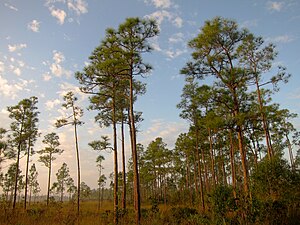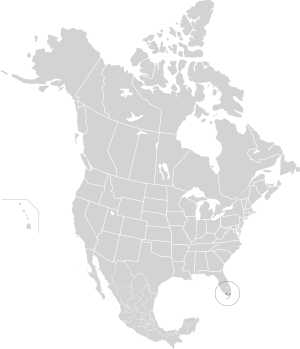Rockland hammock
| South Florida rocklands | |
|---|---|

Pine rockland in the Everglades
|
|
 |
|
| Ecology | |
| Biome | Tropical and subtropical moist broadleaf forests |
| Bird species | 176 |
| Mammal species | 36 |
| Geography | |
| Area | 2,100 km2 (810 sq mi) |
| Country | United States |
| State | Florida |
| Conservation | |
| Habitat loss | 53.93% |
| Protected | 56.06% |
Coordinates: 25°N 81°W / 25°N 81°W
The South Florida rocklands ecoregion, in the tropical and subtropical moist broadleaf forests biome, occurs in southern Florida and the Florida Keys in the United States, where they would naturally cover an area of 2,100 km2 (810 sq mi). These forests form on limestone outcroppings with very thin soil; the higher elevation separating them from other habitats such as coastal marshes and marl prairies. On mainland Florida, rocklands exist primarily on the Miami Rock Ridge, which extends from the Miami River south to Everglades National Park. South Florida rocklands are further divided into pine rocklands and rockland hammocks.
The pine rockland community canopy is dominated almost exclusively by South Florida slash pine (Pinus elliotti var. densa). Beneath this canopy lies a rich understory composed of grasses, sedges, palms, vines, and shrubs of temperate and tropical origin, such as broomsedge bluestem (Andropogon virginicus), coontie (Zamia integrifolia), fivepetal leaf-flower (Phyllanthus pentaphyllus), Florida bluestem (Andropogon floridanus), Florida clover ash (Tetrazygia bicolor), Florida Keys noseburn (Tragia saxicola), Pineland Snakeherb (Dyschoriste angusta), Pineland spurge (Euphorbia pinetorum), silver bluestem (Bothriochloa saccharoides), and Beyrich threeawn (Aristida beyrichiana). The pine rockland community is South Florida’s most floristically diverse plant community and includes several endemic species. A subclimatic community, pine rocklands have depended on wildfire to keep them from transitioning into hardwood hammocks.
...
Wikipedia
